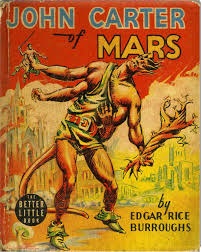Mars has inspired generations of writers. Shortly after the Italian astronomer Schiaparelli first wrote about seeing "channels" or "canals" on the Martian surface in 1877. From 1880 on, writers were inspired by the idea of ancient dying civilizations on a parched planet. There were stories of trips to Mars and visits by Martians. In 1898, H.G. Wells published the "War of the Worlds" about an invasion of Earth by Martians in huge war machines. (In 1938, Orson Wells broadcast a radio play based on the Well's novel and caused widespread panic.)
The Martian stories continued into the Twentieth Century. In 1912, Edgar Rice Burroughs began publishing his Martian stories about an American soldier being transported to a Mars populated by different antagonistic races battling for resources on a dying planet. He continued publishing Mars stories for decades and inspired many imitators.
Many books, short stories, comics, cartoons and movies about Mars were produced up to the 1960s. Many different alien races, technologies, motivations and activities were envisioned. Mars fascinated humanity because it was possible that life could have evolved there. It was conceivable that people could actually visit Mars and, perhaps, even live there. Many stories were written about human colonies on Mars.
Then, beginning in 1965 with Mariner and Viking probes flying by Mars returned pictures that were at odds with the popular understanding of Mars. In 1971, the U.S. Mariner 9 probe to Mars became the first spacecraft to orbit another planet. When detailed photos of the Martian surface were received from Mariner 9, it radically changed our understanding of Mars. There were no channels or canals. It turned out that the networks of lines seen by astronomers in the past were an illusion. There was only a scarred, frigid, desiccated world of craters, deserts, volcanoes, and canyons. There were no signs of any civilization or, indeed, life itself.
Following the realization of how hostile Mars really was, the fiction produced after the Mariner revelations became more focused on human expeditions and colonization attempts. The concept of "terraforming" became popular in fiction as humanity attempted to radically alter the Martian environment to be more friendly to unprotected human beings. Often stories would include plots about Martian colonists trying to exert their independence from Earth authorities.
Although Mars turned out to be a very hostile place for humanity, human fascination with Mars has endured, partly driven by all the fictional accounts during the Twentieth Century. It had been hoped that, following the landing on the Moon in 1969, human exploration of Mars would soon follow. However, interest and investment in space exploration and human expeditions to Mars waned. Only recently has interest in manned Martian mission risen again. One of the most interesting developments has been the efforts of a private company to enlist colonists for a one way trip to Mars to establish a colony. I will discuss this project in a future blog post.
Original cover of an Edgar Rice Burroughs Mars novel:
